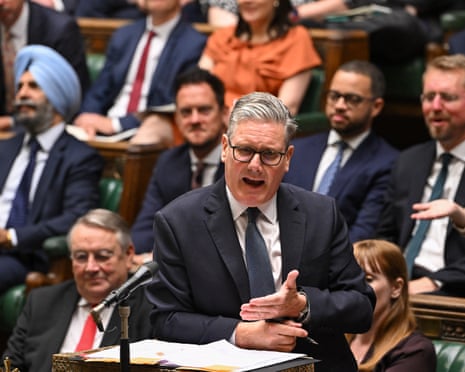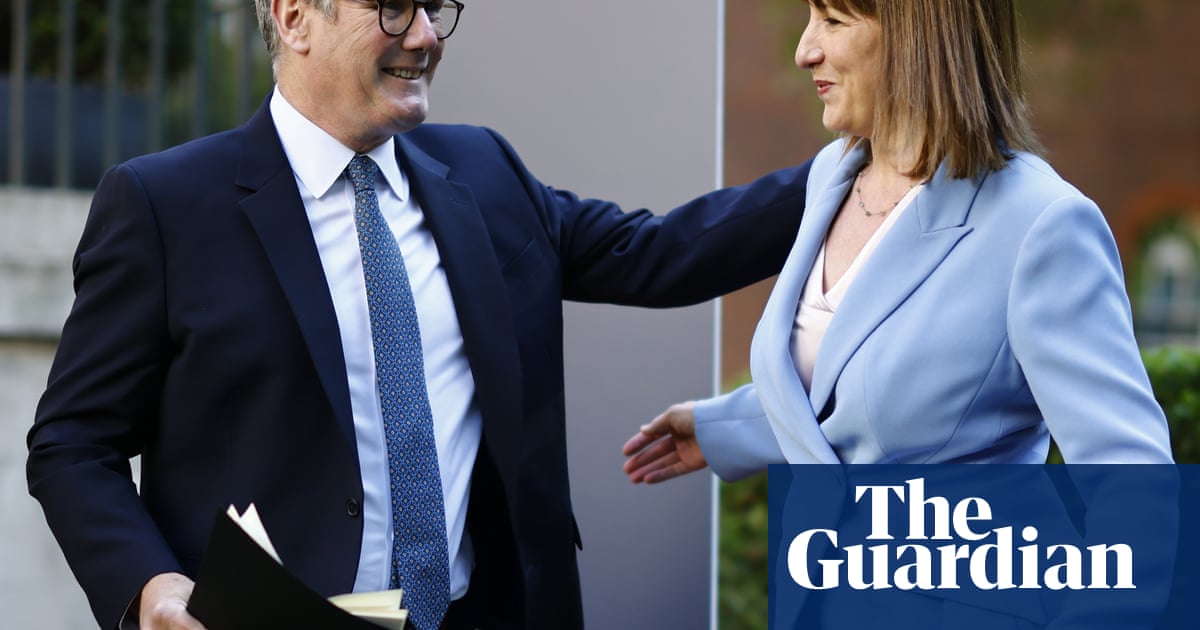Home Office minister defends Keir Starmer’s decision to remove whip from four MPs and says Labour must ‘act as a team’
LIVE Updated 14m ago

Keir Starmer removed whip from four backbenchers for repeatedly breaching discipline. Photograph: UK PARLIAMENT/AFP/Getty Images
Show key events only Please turn on JavaScript to use this feature
Live feed
Jess Phillips says four MPs suspended from Labour were being punished for persistent disloyalty, not welfare bill revolt
Good morning. Chief whips tends to be quite secretive, and when four Labour MPs had the whip suspended yesterday, there was no detailed, public explanation as to why they were being punished for rebelling when so many other backbenchers, who have also voted against the party, have not been singled out. As Eleni Courea and Jessica Elgot report in our overnight story, we were just told they were regular rebels.
But the best explanation came from the Labour party source who told Geri Scott from the Times that the four MPs – Rachael Maskell, Neil Duncan-Jordan, Brian Leishman and Chris Hinchliff – were being punished for “persistent knobheadery”.
This is problematic because, if “persistent knobheadery” is a crime, then some of the greatest parliamentarians of all time were also guilty of it. Winston Churchill is regarded as a hero, but he twice switched parties and in the 1930s, when he was leading a lonely fight against his party and over self-government for India and appeasement, “knobhead” would have been one of the politer things colleagues would have said about him. The same is true of Aneurin Bevan during the second world war, and again in the 1950s. And Enoch Powell, and Tony Benn, and Jeremy Corbyn – and many others.
The four MPs disciplined yesterday are not necessarily in the same category as most of these figures, but some Labour MPs are unhappy at the precedent that has been set.
Jess Phillips, the minister for safeguarding, has been doing interviews this morning. She was meant to be talking about measures announced today that the Home Office says will mean “more women and children will be better protected from domestic abuse through the direct targeting of perpetrators”, but inevitably she ended up defending the decision taken yesterday.
All four MPs suspended voted against the government’s welfare bill, even after the government announced two sets of major concessions, and one of them, Rachael Maskell, ended up leading the opposition on the day of the final vote. But Phillips claimed the four were not being punished for their opposition to the cuts in sickness and disability benefits. She told the Today programme:
I don’t think that the discipline that has been meted out over the last 24 hours is linked to [the welfare bill] because many more people voted against the government than these four people.
But when asked why they were being disciplined, Phillips claimed not to know the full story. Asked what the reasons were for the MPs being suspended, she replied:
I actually don’t know because I’m not part of the disciplining team.
But “a level of persistence” was probably a factor, she said.
And she said discipline was important.
The reality is there has to be an element of discipline, otherwise, you end up not being able to govern.
I am a plain speaker and I will tell you that I disagree often with directions that are going on, and I spend time working with colleagues, both on the back and front benches, ensuring that we discuss those things.
I think that constantly taking to the airwaves and slagging off your own government, I have to say, what did you think was going to happen?
Here is the agenda for the day.
10.30am: Keir Starmer is due to launch a Civil Society Covenant at an event in London.
11.30am: Downing Street holds a lobby briefing.
Lunchtime: Starmer welcomes Friedrich Merz, the German chancellor, to Downing Street.
Afternoon: Starmer and Merz visit a factory in Hertfordshire, where they will speak to the media.
Around 4pm: Wes Streeting, health secretary, holds a meeting with the BMA’s resident doctors committee.
If you want to contact me, please post a message below the line when comments are open (normally between 10am and 3pm at the moment), or message me on social media. I can’t read all the messages BTL, but if you put “Andrew” in a message aimed at me, I am more likely to see it because I search for posts containing that word.
If you want to flag something up urgently, it is best to use social media. You can reach me on Bluesky at @andrewsparrowgdn.bsky.social. The Guardian has given up posting from its official accounts on X, but individual Guardian journalists are there, I still have my account, and if you message me there at @AndrewSparrow, I will see it and respond if necessary.
I find it very helpful when readers point out mistakes, even minor typos. No error is too small to correct. And I find your questions very interesting too. I can’t promise to reply to them all, but I will try to reply to as many as I can, either BTL or sometimes in the blog.
Key events Show key events only Please turn on JavaScript to use this feature
Labour says Reform UK putting thousands of jobs at risk by warning firms they will lose green subsidies if Farage wins
Reform UK has told Britain’s biggest wind and solar developers it will end their access to a clean energy subsidy scheme if it wins power, PA Media reports. PA says:
Deputy leader Richard Tice has written to firms giving them “formal notice” that the party would axe deals aimed at offering sustainable generators protection against market volatility.
The Contracts for Difference (CfD) scheme sees developers guaranteed a fixed price for electricity – independent of the wholesale price – in the hope of encouraging companies to invest in renewable projects.
In a letter to companies including Octopus Energy and SSE Renewables , Tice claimed “there is no public mandate for the real-world consequences” of the clean power agenda. If Reform won an election, he said “we will seek to strike down all contracts signed under AR7” – the upcoming allocation round for CfDs.
“Let me be clear: if you enter bids in AR7, you do so at your own risk. The political consensus that has sheltered your industry for nearly two decades is fracturing.”
He added that participation in the upcoming CfD auction “carries significant political, financial and regulatory risk” for company shareholders.
Climate analysts said the move would drive away investment and put British jobs in jeopardy.
Commenting on the move, a Labour party spokesperson said:
Reform are now actively trying to discourage businesses from investing in clean energy in the UK - leaving bills higher for families, threatening hundreds of thousands of good jobs across the country and putting our energy security at risk. They are disgracefully trying to undermine the UK’s national interest.
This Labour government is cutting energy bills for millions of families, schools, and hospitals, and creating good jobs in our industrial heartlands, to put more money in working people’s pockets. Reform are trying to put all of this at risk.
And Jess Ralston, an analyst at the Energy and Climate Intelligence Unit, a thinktank promoting informed debate on climate issues, said:
The aim of the letter appears to be to put good, well-paid British jobs in jeopardy, driving away investment in the economy and denying people the opportunity to make a living. Polling shows the public see clean energy as the number one growth sector for the UK.
Arguing against British renewables is arguing for more foreign gas, which will increasingly come from abroad as the North Sea continues its inevitable decline - a geological fact. Gas has cost the UK £140bn over the last few years and is set to remain more expensive than pre-crisis levels in the long term. So building more renewables means energy security and shielding households from volatile international gas markets, which the voting public are keen to see.
UK unemployment rises and wage growth slows as jobs market ‘weakens’
Unemployment climbed and wage growth slowed in the three months to May, according to official figures that will pressure the Bank of England to cut interest rates next month. Phillip Inman has the story.
Rachael Maskell says being suspended from Labour over rebel votes won't stop her speaking up for disabled people
Rachael Maskell, one of the four Labour MPs suspended from the parliamentary party yesterday, tabled the reasoned amendment that would have killed off the welfare bill. She pushed it to a vote even after a last-minute concession from the government that ripped out the clauses that would have cut eligibility for Pip, a disability benefit.
In an interview on the Today programme this morning, Maskell defended her actions. She said:
I don’t see myself as a ringleader, I joined with other colleagues who had similar concerns about this legislation. We ultimately do believe that cutting money from some of the poorest in our society is not what a Labour government should be doing.
Of course I brought to parliament the voices of my constituents, in fact I told stories within the debate about their fragile mental health and the implications of losing money and the reforms would have on them.
Quite frankly, disabled people are very invisible in our society, they don’t have agency and voice. What was so important about that debate was the recognition of that.
Asked repeatedly if she was willing to change her behaviour so she could be readmitted to the parliamentary Labour party, Maskell said she was Labour “through and through” and that she hoped the party would learn. When Nick Robinson, the presenter, put the question for the third time, Maskell replied: “It’s not about my behaviour.” Robinson said it was, because that was why she was suspended. He then asked Maskell to confirm that she would not change her behaviour, and Maskell replied: “I will continue to advocate for my constituents, of course.”
Eleni Courea has more on the interview here.
Diane Abbott says she stands by racism comments that led to suspension from Labour
Diane Abbott has said she has no regrets about comments on racism that led to her year-long suspension from the Labour party, Eleni Courea reports.
There are two urgent questions in the Commons today after 10.30am: first one from the Lib Dem Paul Holmes about the government’s elections strategy, being published today, and then one from the Tory Luke Evans about NHS pensions and the impact of administrative delays on frontline care.
After that, from about 11.30am, we’ll get the business statement from Lucy Powell, leader of the Commons, followed by a statement about Ukraine from John Healey, the defence secretary.
Jess Phillips says four MPs suspended from Labour were being punished for persistent disloyalty, not welfare bill revolt
Good morning. Chief whips tends to be quite secretive, and when four Labour MPs had the whip suspended yesterday, there was no detailed, public explanation as to why they were being punished for rebelling when so many other backbenchers, who have also voted against the party, have not been singled out. As Eleni Courea and Jessica Elgot report in our overnight story, we were just told they were regular rebels.
But the best explanation came from the Labour party source who told Geri Scott from the Times that the four MPs – Rachael Maskell, Neil Duncan-Jordan, Brian Leishman and Chris Hinchliff – were being punished for “persistent knobheadery”.
This is problematic because, if “persistent knobheadery” is a crime, then some of the greatest parliamentarians of all time were also guilty of it. Winston Churchill is regarded as a hero, but he twice switched parties and in the 1930s, when he was leading a lonely fight against his party and over self-government for India and appeasement, “knobhead” would have been one of the politer things colleagues would have said about him. The same is true of Aneurin Bevan during the second world war, and again in the 1950s. And Enoch Powell, and Tony Benn, and Jeremy Corbyn – and many others.
The four MPs disciplined yesterday are not necessarily in the same category as most of these figures, but some Labour MPs are unhappy at the precedent that has been set.
Jess Phillips, the minister for safeguarding, has been doing interviews this morning. She was meant to be talking about measures announced today that the Home Office says will mean “more women and children will be better protected from domestic abuse through the direct targeting of perpetrators”, but inevitably she ended up defending the decision taken yesterday.
All four MPs suspended voted against the government’s welfare bill, even after the government announced two sets of major concessions, and one of them, Rachael Maskell, ended up leading the opposition on the day of the final vote. But Phillips claimed the four were not being punished for their opposition to the cuts in sickness and disability benefits. She told the Today programme:
I don’t think that the discipline that has been meted out over the last 24 hours is linked to [the welfare bill] because many more people voted against the government than these four people.
But when asked why they were being disciplined, Phillips claimed not to know the full story. Asked what the reasons were for the MPs being suspended, she replied:
I actually don’t know because I’m not part of the disciplining team.
But “a level of persistence” was probably a factor, she said.
And she said discipline was important.
The reality is there has to be an element of discipline, otherwise, you end up not being able to govern.
I am a plain speaker and I will tell you that I disagree often with directions that are going on, and I spend time working with colleagues, both on the back and front benches, ensuring that we discuss those things.
I think that constantly taking to the airwaves and slagging off your own government, I have to say, what did you think was going to happen?
Here is the agenda for the day.
10.30am: Keir Starmer is due to launch a Civil Society Covenant at an event in London.
11.30am: Downing Street holds a lobby briefing.
Lunchtime: Starmer welcomes Friedrich Merz, the German chancellor, to Downing Street.
Afternoon: Starmer and Merz visit a factory in Hertfordshire, where they will speak to the media.
Around 4pm: Wes Streeting, health secretary, holds a meeting with the BMA’s resident doctors committee.
If you want to contact me, please post a message below the line when comments are open (normally between 10am and 3pm at the moment), or message me on social media. I can’t read all the messages BTL, but if you put “Andrew” in a message aimed at me, I am more likely to see it because I search for posts containing that word.
If you want to flag something up urgently, it is best to use social media. You can reach me on Bluesky at @andrewsparrowgdn.bsky.social. The Guardian has given up posting from its official accounts on X, but individual Guardian journalists are there, I still have my account, and if you message me there at @AndrewSparrow, I will see it and respond if necessary.
I find it very helpful when readers point out mistakes, even minor typos. No error is too small to correct. And I find your questions very interesting too. I can’t promise to reply to them all, but I will try to reply to as many as I can, either BTL or sometimes in the blog.
Explore more on these topics

 3 months ago
75
3 months ago
75

















































